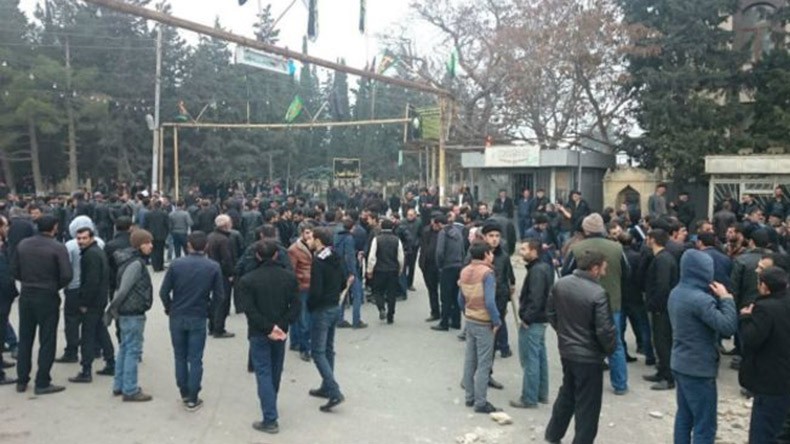
Italian journalist: “Fires” of protest capture Azerbaijani regions marking the end of oil era
An unprecedented wave of protests has gone throughout the territory of Azerbaijan since November 2015 and continues until now. The Caucasian country “is experiencing an explosive season” due to the drop of oil prices. The widespread corruption and political repressions worsen the situation in Azerbaijan even more, Italian journalist Simone Zoppellaro writes for the website of Il Manifesto newspaper.
According to the journalist, the civil society is sick and tired of the continuous abuse of power by the authorities of the country and that is why it has started the protests. As a result, several people were killed, and more than 100 people were arrested.
The author informs that everything started on November 25-26, 2015 in Nardaran, a village several kilometers from the capital city Baku. “Shia Islam is the basis of many peoples’ lives in the religious suburb,” this is how the author describes Nardaran and adds that despite the economic boom in the period of 2003-2012, the settlement lived in poverty. The anger of the citizens “exploded” and they started protests, and Azerbaijani special troops opened fire against them. During the clashes, 7 people were killed, including 2 policemen and 5 believers. The ruling regime wanted to suppress the demonstration by force, hoping “to finish this part as soon as possible.” But it did not happen. In January, Azerbaijani national currency, manat, dropped to the bottom.
Zoppellaro informs that the devaluation of manat has brought forward dramatic consequences: people lost their jobs, all the exchange offices were closed, and a new wave of protests started. “The public discontent has spread as a fire in twelve administrative regions of Azerbaijan. This process reflects the sharp difference between Baku, where few people enjoy a well-to-do and luxurious life, and the rest of the country, which grows more and more exhausted,” the journalist adds.
According to the journalist, after the devaluation, the president of Azerbaijan Ilham Aliyev signed 20 decrees in a few days “as a compensation.” Among the planned measures is the increase of salaries and pensions, which in its turn will increase state expenses.
The Italian journalist emphasizes that there is no diversification in Azerbaijan, and the economy still substantially depends on oil and gas. Besides, the widespread corruption and the regime’s lavish projects, such as Eurovision Song Contest 2012, European Games 2015, European Grand Prix of Formula 1, which is due in 2016, have turned into an obstacle for the right distribution of oil incomes.
Summarizing, the author comes to the conclusion that all this demonstrates the end of the oil era in Azerbaijan.
On 21 December 2015, the Central Bank of Azerbaijan made a decision to switch to a floating rate of the national currency, manat. As a result, the exchange rate of the US dollar and Euro to manat rose by 47.6 percent and 47.9 percent and stood at 1.55 manats and 1.685 manats, respectively. The devaluation of manat led to a severe aggravation of the socio-economic situation in the country causing numerous protests in the regions.
Newsfeed
Videos






























